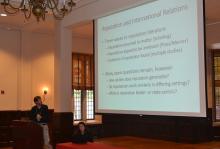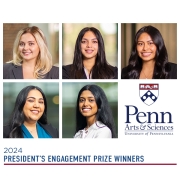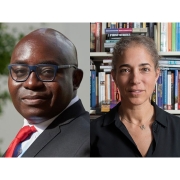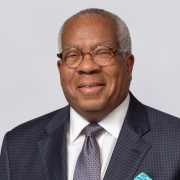Penn Hosts 2014 Peace Science Society Conference

On October 10-11, Penn played host to the Peace Science Society Conference, an annual event that encourages the development of peace analysis and conflict management, with a particular focus on how social science theory relates to international relations. Presenters included scholars and experts from a wide variety of fields. Representing Penn as speakers were Assistant Professor of Political Science Alex Weisiger, Assistant Professor of Political Science Jessica Stanton, and Evan Perkoski, a political science Ph.D. candidate.
"The Peace Science Society Annual Conference is one of the largest conferences featuring rigorous academic research on peace, violence, and conflict around the world,” says Michael Horowitz, Associate Professor of Political Science and one of the event's organizers and presenters. ”Given that Penn was the home of the Peace Science Society in the mid-1960s, it is an honor to host the conference as it returned to Philadelphia."
Weisiger presented findings from his paper “Revisiting Reputation: How Past Actions Matter in International Politics,” which he co-wrote with political scientist Keren Yarhi-Milo of Princeton University. His talk focused on whether international reputation is tied more closely to leaders or to states: “We ask questions like, did the reputation of the U.S. ‘reset’ when President Bush left office, or did the way the international community viewed the U.S. carry over into the Obama administration?” His presentation also examined whether or not the political system of any given state—autocracies versus democracies, for instance—impacted the public’s view of its leaders.
Stanton’s presentation, titled “Domestic Prosecutions for International Crimes: Civil War, War Crimes, and Post-Conflict Justice,” included original research on when and how countries prosecute war crimes after a civil war has ended, while Perkoski addressed the question of what explains the different tactics used by different terrorist groups, in a talk co-authored with Horowitz and political scientist Philip Potter of the University of Virginia.
In addition to providing speakers to the conference, the political science department also saw the event as an opportunity to get students involved, says Ph.D. candidate Max Margulies. "It was a great opportunity to see how an academic conference is run, but more importantly, I was able to meet so many young professionals doing amazing new research in my field."
The conference was sponsored by the Browne Center for International Politics, the Department of Political Science, Perry World House, Penn Arts and Sciences, and the University Research Foundation.





